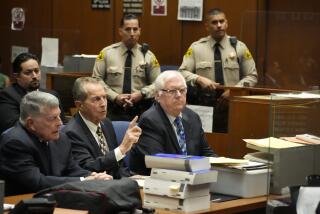Closing arguments made in slaying of neo-Nazi father
- Share via
One photograph captured Jeffrey Hall and his children frolicking in the surf, the other showed his son gripping a toy gun and flashing a Nazi salute along with his dad and a hooded Klansman.
Those contrasting images flashed Wednesday on a courtroom wall in Riverside during closing arguments in the murder trial of a 12-year-old boy who pointed a gun at his father’s head and pulled the trigger, killing the neo-Nazi activist in May 2011.
The fate of the boy, who was 10 years old when he shot his sleeping father, is now in the hands of Riverside County Superior Court Judge Jean P. Leonard, who must decide if the youngster knew what he did was wrong, and what should be done with him.
Hate “cooked” inside the boy during years of being his father’s punching bag and after hearing Hall threaten to burn down the family’s Riverside home with his wife and children inside, said his attorney, Public Defender Matthew Hardy. So the boy turned to the same twisted morality learned from his neo-Nazi father, and grabbed Hall’s own loaded .357 magnum, to end it, Hardy told the judge.
“He believed, in his own damaged way, that what he was doing was justified,” Hardy said. “He felt he had to kill his dad to protect the family.”
Hardy said the boy was “almost genetically programmed to commit violence” after his birth mother’s use of heroin, methamphetamine and other drugs while pregnant altered his neurological wiring. Hall and the boy’s mother divorced shortly after he was born, with Hall taking custody of his son when he was 3. The boy started throwing violent, uncontrollable tantrums while still a toddler and, in school, stabbed teachers and students with pencils.
“This young man never had a chance,” Hardy said.
Chief Deputy Dist. Atty. Michael Soccio, however, urged the judge not to let the boy escape into the “Alice in Wonderland” juvenile justice system to avoid responsibility for a cold-blooded murder.
Hall was dozing on the living room couch, posing no imminent danger and “probably drunk” when he was shot, Soccio said. The boy also had revealed his plans to his little sister the day before, the prosecutor argued. Soccio played a police recording, captured the morning of the shooting, in which the sobbing girl told her brother: You said you were going to “shoot him in the stomach.”
“He chose on his own to sneak downstairs and kill a sleeping parent,” Soccio said. “He made the choice to kill his father.”
Soccio said Hall’s affiliation with the National Socialist Movement, while abhorrent to most, didn’t mean he was a bad parent, nor did it justify his murder. The prosecutor also said there was no concrete evidence that Hall had been abusive.
In fact, Hall sought help from teachers, relatives and others to help control his son’s violent outbursts, Soccio said. The prosecutor showed family photographs of Hall and his children playing on swing sets and decorating the Christmas tree, as well as Hall making balloon animals for his kids.
“Jeffrey Hall was a father who cared for his son,” Soccio said.
The final photograph shown was of Hall lying dead on the couch, his neck splattered with blood and a bullet hole behind his ear.
The boy, who is not being named by The Times because he is a minor, is being tried as a juvenile.
If the judge agrees with the defense, the boy would be released, possibly into the foster care system. If she finds him responsible, she could send the youngster to a state prison facility for juveniles or a treatment facility for delinquents, or place him on probation. The boy could remain in juvenile custody until he is 23, at which time the district attorney’s office has the rarely used option of petitioning the court to extend his sentence one year at a time.
If the judge agrees with the prosecution, she also must decide whether the boy’s actions fell short of murder and amounted to voluntary manslaughter, in which a defendant had an unreasonable belief that he was in imminent danger or needed to use deadly force.
The boy’s attorney said he fears what would happen if his client were sent to one of the state youth prisons, which have a history of abuse and violence.
“You put the kid in the Department of Juvenile Justice, you might be creating a serial killer,” Hardy said after Wednesday’s proceedings. “He needs to be placed somewhere where professionals can treat him.”
More to Read
Sign up for Essential California
The most important California stories and recommendations in your inbox every morning.
You may occasionally receive promotional content from the Los Angeles Times.














